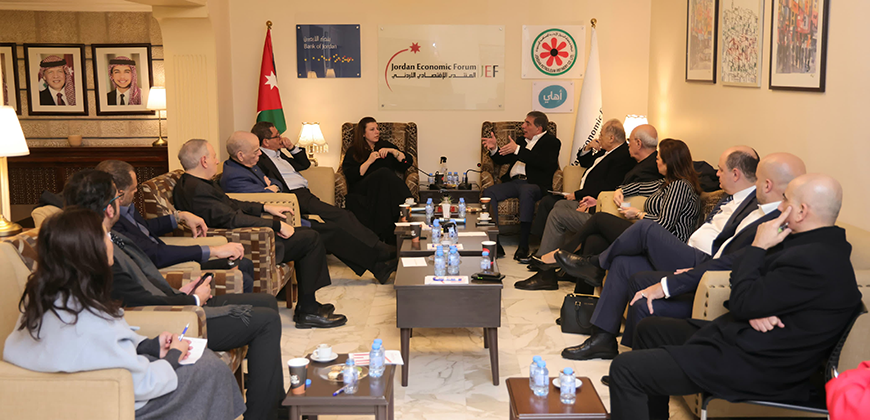AMMAN — The Jordan Economic Forum (JEF) has recently held a panel discussion featuring Dana Said Shuqom, which was attended by JEF President Mazen Homoud, former foreign ministers, current and former ambassadors, members of the Senate, economic experts, tourism professionals, and JEF members.
The session focused on presenting and discussing Shuqom’s research, which examines the use of tourism policy as a tool for achieving state objectives in diplomacy and foreign policy and economic development, according to a JEF statement.
This research forms part of her doctoral dissertation titled “States, Stories, and Sightseeing: Tourism Policy and Narrative Control in Foreign Policy,” for which she earned her PhD in Political Science and International Relations last November.
Homoud opened the session by stressing the importance of hosting academic and economic talent at the forum to foster constructive dialogue and the exchange of ideas that serve the national economy.
He highlighted that Shuqom had recently defended her dissertation at McMaster University in Canada, commending her academic efforts and the unique subject matter of her research.
Homoud explained that the JEF regularly organises sessions that bring together prominent figures from both the public and private sectors who have made significant contributions to the Jordanian society.
He noted that such gatherings aim to shed light on successful initiatives and experiences that contribute to economic development, pointing out that academic research remains a key driver of progress and innovation in various fields.
Homoud also highlighted the JEF’s new approach of involving academics and researchers to present the findings of their studies on issues that the JEF deems impactful for Jordan’s economy, stressing that these discussions allow for diverse perspectives on critical economic topics.
Concluding his remarks, Homoud reaffirmed the forum’s commitment to serving as a platform that brings together decision-makers, academics, and economic experts to exchange ideas and visions that can propel Jordan’s economy forward.
During her presentation, Shuqom highlighted Saudi Arabia as a successful example of leveraging tourism to reshape its international narrative to achieve diplomatic, security and economic objectives.
She explored how similar strategies could support Jordan’s future economic and diplomatic vision; whereby different components of its tourism policy could be utilised to convey desired messages that support the Kingdom’s foreign policy and economic goals.
Shuqom said that tourism has become an effective tool for communicating with foreign publics as an instrument of public diplomacy, citing Saudi Arabia’s experience as a significant model in this context.
She explained that her research involved an in-depth analysis of Saudi Arabia’s efforts to use tourism policy to enhance its global image.
She noted that countries seeking to transform their global image often begin by determining the existing narratives circulating about them and then working to design and distribute new narratives that align with their future vision.
Shuqom said that Saudi Arabia, for instance, has placed tourism at the centre of this transformation, using such tools as events, advertising, social media, celebrities, World Expo and legislation changes to market a modern image that resonates with global public audiences, particularly youth.
She discussed how tourism policy, in this way, serves as a form of “tourism diplomacy” and “public diplomacy”, extending beyond its traditional domestic economic role to play a more strategic role in strengthening a country’s international relations and advancing its foreign policy goals.
Shuqom stressed the need for well-crafted tourism promotional strategies that relay the desired persona and messaging about the country, while marketing its tourism offerings.
